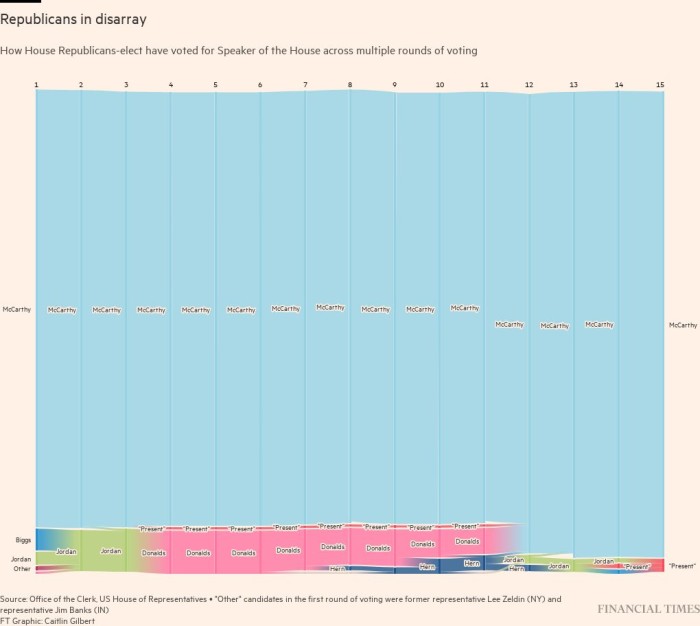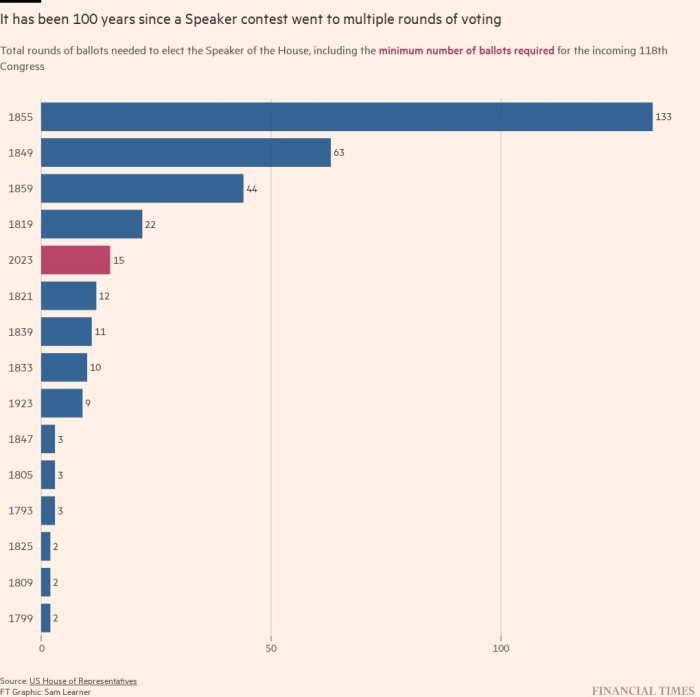Kevin McCarthy loses US House Speakership vote for 14th time
Republican Kevin McCarthy suffered another humiliating defeat on Friday night, after he failed to be elected Speaker of the House of Representatives in a historic 14th round of voting.
McCarthy appeared on course to seize the Speaker’s gavel earlier in the evening, after convincing a large number of party rebels to support his bid to lead the lower chamber of Congress. But in the end he lost by the narrowest of margins, after four fellow Republicans voted for alternate write-in candidates, and another two voted “present”.
McCarthy appeared visibly upset by the result, and in a last-ditch attempt walked over to Florida’s Matt Gaetz and Colorado’s Lauren Boebert before the vote officially closed. Gaetz and Boebert voted “present” rather than in favour of McCarthy — a technicality that deprived him of the simple majority required to become Speaker.
Earlier on Friday, McCarthy told reporters on Capitol Hill: “I’ll have the votes.” When asked why he was confident, the congressman from California replied: “Because I count.”
McCarthy struck the bullish tone after making several rounds of concessions to his critics, including rule changes that would make it easier to call for a vote of no confidence in a future Speaker, and promises of plum committee assignments for members of the ultra-conservative House Freedom Caucus.
Those efforts swayed more than half of the 20 Republicans who had opposed his speakership in previous rounds of voting, including Dan Bishop of North Carolina and Byron Donalds of Florida. But they did not persuade enough Republicans to hand McCarthy the victory that has eluded him for four days and counting.

Bob Good, a Virginia Republican who has been among the dissidents, told the FT on Friday morning that he would not support McCarthy “at any time”.
“The whole reality is he does not have 218, he’s not going to have 218, and the sooner that he surrenders to that reality, the sooner we can move forward as a conference and begin to debate, vet and assess . . . [alternative] candidates,” he said.

Good said he would like to see Jim Jordan, the Ohio Republican, as Speaker, but suggested that other members should propose Steve Scalise, the Louisiana Republican and a member of the House Republican leadership, as a possible candidate. “There are members who are in support of him, I think they should put his name forward, nominate him, and vote for him.”
Even though McCarthy had made big concessions in recent days, there remained a significant lack of “trust” in his willingness to follow through with them, Good said.
“He doesn’t believe in any of the things he’s agreeing to do so he would be doing them only under compulsion because he’s desperate,” Good said.
The last time it took more than one round of voting to select a Speaker was 1923, when it took nine ballots. The House is constitutionally required to select a Speaker, and cannot move on to any legislative business until someone is handed the gavel.
The Republican infighting has exposed long-simmering tensions in a party that is grappling with how to move forward after a relatively disappointing performance in November’s midterm elections.

McCarthy finds himself in a difficult position in part because the “red wave” he and others predicted did not materialise, and Republicans now control the House by a razor-thin margin.
The gridlock in the House has also raised questions about how Congress will function for the next two years, and whether McCarthy or any other Speaker will be able to wrangle the party’s warring factions to pass any legislation.
One looming threat is the possibility of a debt ceiling crisis later this year. Economists have forecast that the US economy risks default in the third quarter if lawmakers do not agree to raise the limit on government borrowing.
For all the latest Business News Click Here
For the latest news and updates, follow us on Google News.
